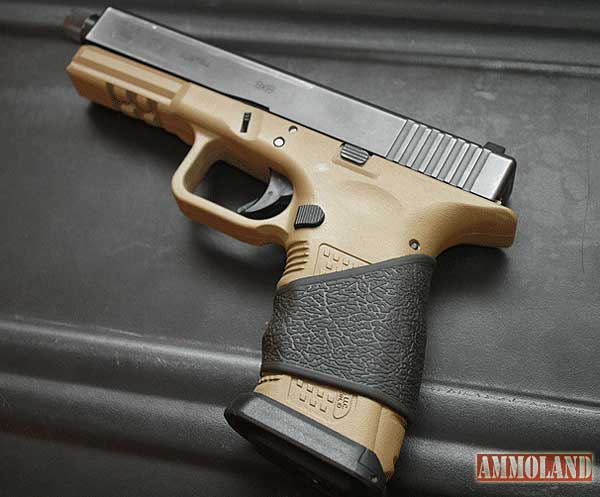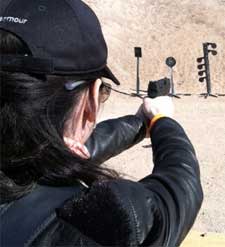By Shari Spivack


New Jersey –-(Ammoland.com)- If empty shelves at gun stores are any indication, there has been a huge surge in gun purchases and interest in the last few weeks, but the trend began many months ago.
Feeling lost in your decision to buy a handgun? Maybe you need a purchase guide of the best handgun first time owner.
In sharp contrast to the restrictive gun laws being proposed around the country, at gun stores, customers have been arriving in droves to purchase their first handgun and register for beginner pistol classes. Customers are coming in with a varied range of firearms knowledge but mainly they are looking to the sales person to guide them in the purchase of their first handgun.
When I work with a customer, I try to assess and engage them from whatever position they are currently in. Many first time gun buyers have never held a gun in their hand and the case full of guns can be intimidating. Maybe it’s my social work background where a successful way to engage a client is by understanding and meeting them at their present perspective of a situation. So I start by asking the customer if they have any experience with guns. Knowing a customer’s background with guns provides a great deal of information to help the sale go more smoothly on both sides. While no one likes to be talked “down” to, there are customers that don’t know the difference between a semi-automatic pistol and a revolver and why they would want one over the other. In this case, more guidance is necessary. Vocabulary as well as basic gun operation will have to be explained.
People also enjoy talking about their guns and their gun experiences. I know I do. For salespeople it can often be the same story all day long, but for the customer it’s exciting – it’s their trip to the gun shop and they deserve to enjoy it.
The next question I usually ask is why the customer is buying the gun is what the gun will be mainly used for. In NJ very few people are looking to buy a carry gun so I can usually cross this need off the list. Usually people are looking either for a target or home defense gun but most often they want a gun to do both jobs. When a customer says the gun will sit in a nightstand drawer they aren’t always interested in the same features as someone who is going to take their gun to the range on a regular basis or use it in pistol courses.
Although I do encourage customers that buy a gun for home defense not to leave it in a drawer and forget about it. It’s your gun and you should feel comfortable with it; that means taking it out to the range at least occasionally to run some ammunition through it and be familiar with its operation.
Once purpose is determined, the next hurdle is choosing caliber. Customers often do research before they come in which can be either a good and bad thing. An educated buyer is always a plus. However when an elderly woman who wanted a specific .38 realized that that meant a revolver which was far too heavy for her to hold and pull the trigger on, she became disappointed. The gun would also be shared with her husband who wanted the higher round capacity and the longer barrel. It became clear they would have to go with another caliber for this gun. She had done a great deal of research on the “best” first gun for home defense and she took her pages, printed from the internet and crumpled them up at the counter.
So much for research she said. No, I told her. Her research was good and it helped her and her husband be comfortable with the gun they eventually chose.
First time handgun purchasers that are buying a gun for home defense and want to also use it for sporting purposes like shooting at the range now and again, often do well with a 9mm.
A .22 isn’t the best gun for home defense although first time customers sometimes think they need to start with a .22 because they won’t be able to handle anything larger. Unless someone has a physical limitation, or if they are going to eventually purchase several guns in different calibers, a .22 is not usually necessary for a first handgun, especially one that will be used for home defense. It can be equally difficult to convince a customer who doesn’t think a 9mm will get the job done and insists on a 40 S&W because that is “what the police use” to consider a 9mm.
A 9mm WILL get the job done. I encourage them to practice or take a class because shot placement is your best friend when using a handgun for home defense. And home defense rounds can be purchased that will make the 9mm a good choice as well.
If a customer insists on a larger caliber gun I would rather see them buy a .45 ACP then a 40 S&W. The .45 is a less snappy round which will likely be easier and more enjoyable to shoot especially for a first time gun owner. However if the customer expects to do a lot of target shooting then the 9mm is going to be the more cost effective option as well.
The next step is simply to start putting guns that fit their criteria in their hands while also trying not to overwhelm them with too many choices. Once the viable choices have been laid out on the counter we slowly start eliminating the ones that:
- a. “Don’t feel right”,
- b. Cost more than they wanted to spend,
- c. Have a safety vs. don’t have an external safety etc.
This usually narrows down the choices to one or two and if a choice has to be made for example on aesthetics I believe you have to like your gun too. It’s a big purchase and I want to open my safe and be happy with what’s inside. If a customer keeps turning his eyes back towards a stainless steel model over a black matte model then in my opinion it’s worth it.
External Safeties
A word on external safeties – some people just insist on having them. They refuse to buy a gun without one. If you follow the rules of safe shooting then you know the most effective safety and the only one you can rely on all the time is the one between your ears. I encourage people to remember this even if they insist on a gun with an external safety.
Those who know me joke that if I had my way everyone would walk out of the store with a Glock. I don’t know that is true, however a Glock can fit many of the needs of first time gun owners. That doesn’t mean it’s the right gun for everyone who walks through the door. If a customer allows the salesperson to help guide them towards the right gun then it is the salesperson’s responsibility to listen to what they are asking for. And that can be challenging especially if customer has never seen let alone held a gun in their hands before.
For example, last week a young lady came in and she would barely even touch the glass case. She looked and acted like she didn’t belong there, but she had her permit (NJ required) ready to go and she was there to buy something – well maybe, she thought so, actually she wasn’t so sure… As I tried to draw out what she was looking for by asking some questions and chatting with her, she opened up a bit and I eventually helped her narrow down her choices to a Glock which seemed to fit her needs and her hand the best. At the point when she was basically sold on the Glock I added, “And it’s also easy to clean.”
Suddenly she looked panic stricken and said “What? I have to clean it.” Oh boy. “Yes, you have to clean it.” “Can’t I pay someone to do that for me?” she asked. I had to make a moral decision here…do I take this innocent person’s money to do a job she can and should do herself? Nope.
“Listen, if you are going to buy a gun you have to know how to clean it. I’m going to give you the name of an instructor who teaches with Glocks, take a class and come back and see us for your gun.”
Relieved she took the card and signed up for a first step pistol class. I could have sold her the gun right then, and maybe I should have. Some people can take the gun and the referral on the same day. But she will be back and I will feel better selling her the gun when she is really ready.
Turbo Glock Image: https://www.maxvenom.com/turbo_glock
